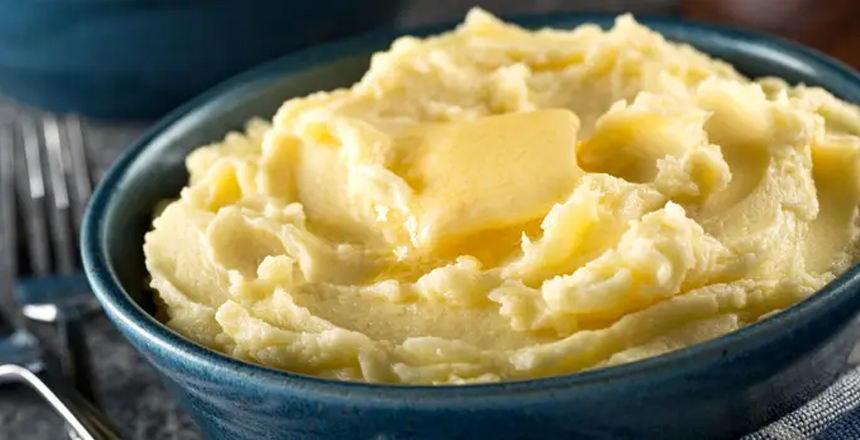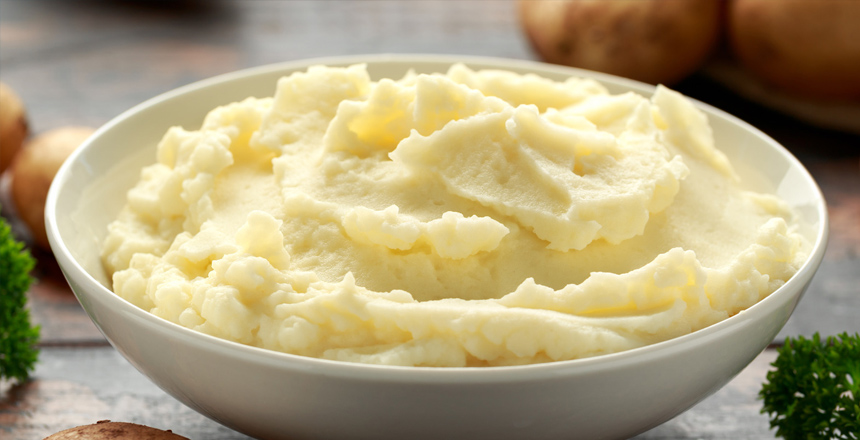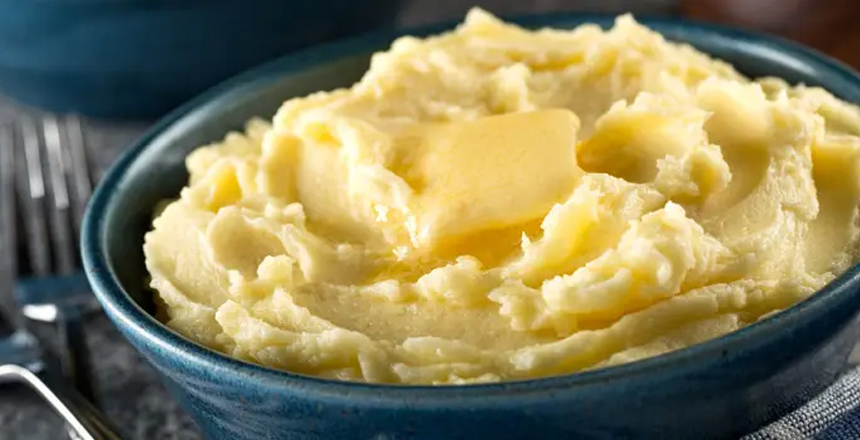Mashed potatoes are a beloved side dish that pairs perfectly with a variety of meals. Whether you make them from scratch or have leftovers from a big family dinner, the question of how long they last is a common one.
We’ll take a closer look at the shelf life of mashed potatoes, provide some helpful tips on how to extend their freshness, and answer some of the most frequently asked questions on this topic.
So, if you’re curious about how long mashed potatoes can last, keep reading to find out!
Read more:
How Long Can Leftover Mashed Potatoes Last?

If you’re wondering how long leftover mashed potatoes can last in the fridge, the answer is, it depends. On average, mashed potatoes can last anywhere from three to five days if stored properly in the refrigerator.
The key is to make sure they’re stored in an airtight container to avoid any potential contamination from other foods in the fridge.
Keep in mind that the longer mashed potatoes are stored, the more the texture and taste may change, so it’s best to consume them sooner rather than later.
In addition, if there are any signs of spoilage, such as an off smell, discoloration or a slimy texture, it’s best to discard them immediately. By following these tips, you can ensure that your mashed potatoes are stored safely and enjoyed at their best for longer.
How To Better Store Mashed Potatoes?

Proper storage is key to extending the shelf life of mashed potatoes.
- Use an airtight container: This helps prevent any contamination and keeps them fresh for longer.
- Refrigerate promptly: Store leftover mashed potatoes in the refrigerator as quickly as possible after preparation.
- Divide into smaller portions: This makes it easier to reheat and defrost when needed.
- Freeze for longer storage: Mashed potatoes can be frozen for up to six months. Use a freezer-safe container or bag, and label it with the date.
- Thaw slowly: For best results, thaw mashed potatoes slowly in the refrigerator rather than at room temperature or in the microwave.
- Reheat carefully: Avoid adding milk or butter to cold mashed potatoes, as this can promote bacteria growth. Instead, reheat by boiling, microwaving or baking until hot throughout.
Storing your mashed potatoes properly is an important step towards enjoying them for longer, reducing waste, and savoring every last delicious bite.
By using an airtight container, refrigerating promptly, dividing into smaller portions, freezing for longer storage, thawing slowly, and reheating carefully, you can preserve the freshness and flavor of this classic side dish.
Give these tips a try and enjoy delicious mashed potatoes any time, without sacrificing quality or taste.
Signs That Tell Your Mashed Potatoes Went Off
It’s important to recognize when your mashed potatoes have gone bad, not just for the sake of the dish itself, but for your own health and safety.
Whether it’s been sitting in the fridge for a bit too long, or you’re unsure of how fresh it really is, there are a few telltale signs that can clue you into whether or not it’s time to bid farewell to those delicious spuds.
Here are a few things to keep an eye (and nose) out for:
- Off smell: If your mashed potatoes have a sour or foul smell, it’s a sign that bacteria has started to grow.
- Discoloration: If you see any green, blue or black spots on your mashed potatoes, it’s a sure sign that they’ve gone bad.
- Mold: If you see mold growing on your mashed potatoes, it’s time to throw them out.
- Slimy texture: If your mashed potatoes have a slimy texture, it’s a clear indication that bacteria has started to grow.
- Off taste: If there’s a noticeable change in taste, or a sour or bitter aftertaste, it’s time to toss them out.
Ingesting bad food can lead to food poisoning and other health problems. When in doubt, remember the old saying “when in doubt, throw it out!”
Ways To Defrost Your Mashed Potatoes
In case you’ve kept your mashed potatoes in the freezer for longer storage, then it’s important to properly thaw them before reheating. Properly defrosting mashed potatoes is crucial to ensure that they are heated evenly and have a desirable texture.
There are a few ways to defrost your mashed potatoes, depending on how much time you have. The most reliable way is to thaw them in the fridge overnight, but if you’re in a hurry, you can also use a microwave or stovetop.
For microwave defrosting, transfer the mashed potatoes into a microwave-safe dish and heat in short increments, stirring frequently until they have thawed.
For stovetop defrosting, transfer the mashed potatoes into a pot and heat gently over low heat while stirring occasionally.
Just remember to avoid reheating frozen mashed potatoes more than once to maintain their texture and flavor.
Easy Recipes To Serve With Leftover Mashed Potatoes
Mashed potatoes are a versatile side dish that can be served with a range of meals. Here are a few easy and tasty ways to use up your leftover mashed potatoes:
- Shepherd’s Pie: This classic British dish features a savory meat and vegetable filling topped with mashed potatoes. Simply spread your leftover mashed potatoes evenly on top of the filling and bake until golden brown.
- Potato Cakes: Mix some chopped herbs, finely grated cheese, and an egg into your leftover mashed potatoes. Form the mixture into cakes, and pan-fry until golden brown on both sides.
- Potato Soup: Blend your leftover mashed potatoes with some broth or milk, and season the mixture to taste. Reheat the soup on the stove, stirring occasionally until bubbly and hot.
- Cottage Pie: Similar to Shepherd’s Pie, Cottage Pie replaces the lamb with beef mince. Spread your leftover mashed potatoes over a layer of cooked meat and sautéed vegetables and bake until bubbling.
- Pierogi Filling: Mix your leftover mashed potatoes with some grated cheese, chopped cooked bacon, and green onions. Use this filling to stuff pierogi or to add as a topping to pizza.
These easy recipes will give your leftover mashed potatoes a new life and add some excitement to your meals.
FAQs About Shelf Life of Mashed Potatoes
Can I Store My Mashed Potatoes At Room Temperature?
No, mashed potatoes should be stored in the fridge to prevent bacterial growth. Leaving them out at room temperature can cause harmful bacteria to grow rapidly.
Are Mashed Potatoes Still Good After 5 Days?
Mashed potatoes are best consumed within 3-4 days, but they can still be safe to eat after 5 days as long as they are free from any signs of spoilage, such as mold or an off odor.
What Do Bad Mashed Potatoes Smell Like?
Bad mashed potatoes may have a sour, rancid, or spoiled smell. If you notice a strong, unpleasant odor, it’s best to discard them to avoid the risk of food poisoning.
Can Mashed Potatoes Cause Food Poisoning?
Yes, improperly stored or cooked mashed potatoes can harbor harmful bacteria such as Clostridium botulinum, which can cause botulism – a serious form of food poisoning.
How Long Do Mashed Potatoes With Sour Cream Last In The Fridge?
Mashed potatoes with sour cream can last up to 3-4 days in the fridge if stored in an airtight container.
Are Mashed Potatoes Still Good When You Reheat Them Next Day?
Yes, mashed potatoes can be reheated and consumed the next day as long as they are stored and reheated properly. Be sure to thoroughly heat them to kill any bacteria that may have grown.
How Do Restaurants Keep Mashed Potatoes Warm?
Restaurants often use specialized equipment, like warming trays or insulated containers, to keep mashed potatoes warm while maintaining their texture and flavor.
Do You Need To Mash Your Potatoes Again When It’s Out Of The Fridge?
No, you don’t need to mash the potatoes again when taking them out of the fridge. Simply reheat them to the desired temperature and serve as usual.
Click here to read more about mashing your potatoes.
Final Thoughts
Mashed potatoes are a staple side dish that many love for its creamy texture and delicious taste. However, the question of their shelf life can be confusing, leading to food waste or even worse, food poisoning.
Knowing how long mashed potatoes last and how to store them properly is crucial to ensure their safety and extend their shelf life.
Proper handling of mashed potatoes is key to ensuring their safety and freshness. Follow the tips in this article to make the most of your mashed potato dishes and reduce food waste in your home.


